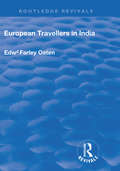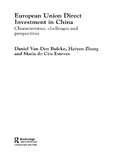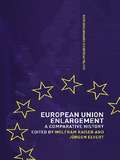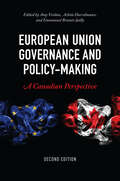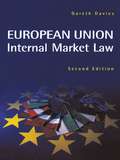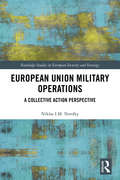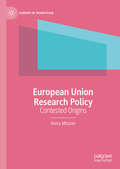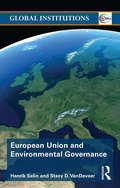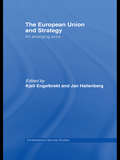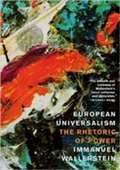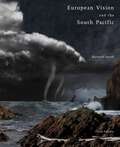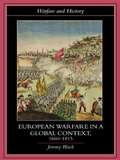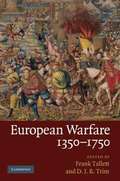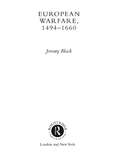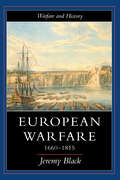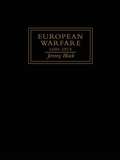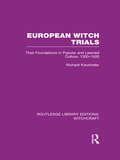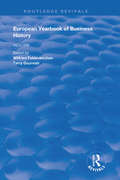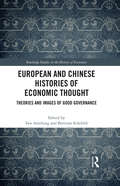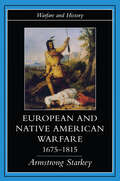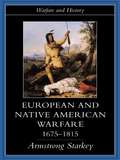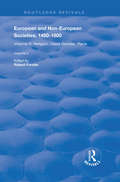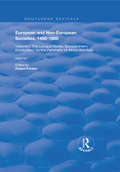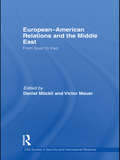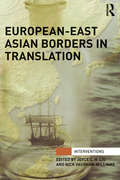- Table View
- List View
European Travellers in India: During the Fifteenth, Sixteenth and Seventeenth Centuries; The Evidence Afforded by them with Respect to Indian Social Institutions and the Nature and Influence of Indian Governments (Routledge Revivals)
by Edward Farley OatenOriginally published in 1909, this book contains a careful dissection and analysis of european travellers in India's narratives; the author has striven throughout to regard the various characters who flit across the following pages in the light as much of adventures and pioneers as of collectors of social and political facts - in other words, the author has tried to preserve in their narrative as much as they could of the large amount of humna interest which naturally invests the subject, and animates the writings, of these early wanderers in India.
European Union Direct Investment in China: Characteristics, Challenges and Perspectives (Routledge Studies In Global Competition Ser. #Vol. 15)
by Daniel Van Den Bulcke Haiyan Zhang Maria do Céu EstevesChina's immersion in the world economy and trading system is a continued source of great interest throughout the globe.The book is divided into three parts, the first being an overview of the Chinese investment environment and the development of foreign direct investment (FDI) over the last twenty years. The second part then goes on to focus specif
European Union Enlargement: A Comparative History (Routledge Advances in European Politics #Vol. 18)
by Wolfram Kaiser Jürgen ElvertEuropean Union Enlargement provides a comparative analysis of the post-war European policies of those states that joined the European Union between 1973 and 1995.The volume draws upon new empirical research in order to investigate the policies that these 'newcomer' states have had towards Europe since 1945, with an emphasis on their experience of membership and its possible Europeanising effect. A final comparative chapter draws the national European policies of the 'newcomers' together and outlines what they have brought to the EU. The book also tests integration theories against the available evidence, demonstrating their limited explanatory value and the economic, political and cultural specificity of different national paths towards EU integration.
European Union Governance and Policy-Making, Second Edition: A Canadian Perspective
by Amy Verdun Emmanuel Brunet-Jailly Achim HurrelmannEuropean Union Governance and Policy-Making introduces the politics of the European Union (EU) to a student audience. The book is explicitly written for students enrolled in universities in Canada, or other non-EU countries, and builds on their academic background. Chapters cover the political and legal system of the EU, theories of European integration, core EU policies such as the Single Market, its single currency, migration policy, EU enlargement, as well as pressing issues facing the further development of European integration. This second edition has been comprehensively revised and updated to include a discussion of Brexit, the European Green Deal, COVID-19, and the Russian invasion of Ukraine. Written by leading Canadian scholars in the field of European integration, as well as international experts with teaching experience in Canadian universities, this textbook leverages the comparison to Canada and its federal system to help students understand what is unique about the European Union.
European Union Internal Market
by Gareth DaviesFirst published in 2003. Routledge is an imprint of Taylor & Francis, an informa company.
European Union Military Operations: A Collective Action Perspective (Routledge Studies in European Security and Strategy)
by Niklas I. NovákyThis book offers an in-depth study on the deployment of military operations in the framework of the European Union’s Common Security and Defence Policy (ESDP/CSDP). While existing studies of the subject are either descriptive or focused on a single level of analysis, this book incorporates factors from three different levels of analysis to explain the deployment of ESDP military operations. First, the international level, where the emergence of events that threaten certain values held dear by EU member states, catalyses the process leading to an operation; second, the national level, where the member states formulate their initial national preferences towards a prospective deployment based on national utility expectations; and third, the EU level, where the member states come to negotiate and seek compromises to accommodate their different national preferences towards a deployment. The strength of this multi-level collective action approach is demonstrated by four in-depth military case studies, which analyse the preference formation of France, Germany, and the UK towards the deployments of Operation Althea in Bosnia and Herzegovina, Operation Artemis and EUFOR RD Congo in the Democratic Republic of the Congo (DRC), and Operation Atalanta off the coast of Somalia, respectively. The author draws on a wealth of primary sources, including over 50 semi-structured interviews conducted with national and EU officials during 2011-15, and provides an up-to-date overview and critique of the existing theoretical literature on the deployment of ESDP/CSDP military operations. This book will be of much interest to students of European security, EU politics, military and strategic studies, and International Relations in general.
European Union Research Policy: Contested Origins (Europe in Transition: The NYU European Studies Series)
by Veera MitznerThis book describes the emergence of research policy as a key competence of the European Union (EU). It shows how the European Community (EC, the predecessor of the EU), which initially had very limited legal competence in the field, progressively developed a solid policy framework presenting science and research as indispensable tools for European economic competitiveness and growth. In the late 20th century Western Europe, hungry for growth, concerned about the American technological lead, and keen to compete in the increasingly open international markets, the argument for a joint European effort in science and technology seemed plausible. However, the EC was building its new functions in an already crowded field of European research collaboration and in a shifting political context marked by austerity, national rivalries, new societal and environmental challenges, and emerging ambivalence about science. This book conveys the contested history of one of the EU’s most successful policies. It is a story of struggle and frustration but also of a great institutional and intellectual continuity. The ideational edifice for the EC/EU research policy that was put in place during the 1960s and 1970s years proved remarkably robust. Its durability enabled the rapid takeoff of the European Commission’s initiatives in the more favorable political atmosphere of the early 1980s and the subsequent expansion of the EU research funding instruments and programs that permanently transformed the European research landscape.
European Union and Environmental Governance (Global Institutions)
by Henrik Selin Stacy D. VanDeveerOver the past five decades, the European Union (EU) has developed into the most legally and politically authoritative regional organization in the world, wielding significant influence across a wide range of issue areas. European Union and Environmental Governance focuses on the growing global role of EU environmental and sustainable development policies. Written in a concise and accessible manner, this book introduces and examines the major European and global environmental issues, debates, and policies and provides a critical, evidence-based evaluation of the achievements and shortcomings to date in EU environmental and sustainability governance. Providing both an historical overview and a discussion of the major future legal, political and economic challenges to the realization of EU goals related to better environmental governance, the authors offer a comprehensive introduction to this key issue. This book will be useful reading for students of global environmental politics, comparative environmental politics and policy, international organizations, European politics, and environmental studies.
European Union and Strategy: An Emerging Actor (Contemporary Security Studies)
by Kjell EngelbrektThis edited volume sets out to explore the paradox that the European Union (EU) produces policies with strategic qualities, but lacks the institutions and concepts to engage in strategic reasoning and action proper. The book has a two-fold agenda, exploring current EU external policies that are, or seem to be, linked to strategic priorities, and also studying the concept of strategy in the particular context of EU decision- and policymaking. The volume first examines the character of the Union as a strategic actor at this stage of its development. It then explores the ability of the Union to act and otherwise influence both its periphery and the wider world, focusing in particular on how it is perceived by other actors. The final section comprises personal assessments by a group of contributors regarding the character of the union as a strategic actor in the present and future. When these are pieced together, a picture emerges of a European strategy in the making, albeit one that so far is modest and partial. This book will be of interest to students of European Security, European Politics and IR.
European Universalism: The Rhetoric of Power
by Immanuel WallersteinAt a time when intervention - in the name of democracy and human rights - has returned to the center of world politics, Wallterstein's treatise is both essential and convincing.
European Vision and the South Pacific Third Edition
by Bernard SmithBernard Smith (1916-2011) was arguably Australia's greatest art historian and one of the most important humanist thinkers internationally on ideas concerning cultural contact. His European Vision and the South Pacific, first published in 1960, showed how the ideas of the Enlightenment and the empirical structuring of scientific and geographical knowledge during the great eighteenth-century voyages of discovery affected notions of identity-both for Europeans and the Indigenous peoples with whom they came in contact. Not only did Smith's investigation of art, science and imperialism of this period explore the conditions of frontier contact, it opened up the dialogue on de-colonisation and allowed us 'to think beyond or after it'. He was undoubtedly a pioneer of post-colonialism and the book remains 'a lighthouse' in pacific studies. The republication of European Vision and the South Pacific is an essential part of the discourse reframing the interconnections and crossing of cultural boundaries between Europe and antipodean societies. This new edition of a significant Australian classic also coincides with the 250th anniversary of Cook's landing on the east coast of Australia, and complements new scholarship on territorialisation, colonialism and the politics of exchange between metropolitan centres and peripheries. A new introduction by Sheridan Palmer situates the book in a contemporary context.
European Warfare in a Global Context, 1660-1815 (Warfare and History)
by Jeremy BlackThis original book presents a global approach to eighteenth century warfare. Emphasis is placed on the importance of conflict in the period and the capacity for decisiveness in impact and development in method. Through this Jeremy Black extends the view beyond land to naval conflict. European Warfare in a Global Context offers a comparative approach, in the sense of considering Western developments alongside those elsewhere, furthermore it puts emphasis on conflict between Western and non-western powers. This approach necessarily reconsiders developments within the West, but also offers a shift in emphasis from standard narrative of the latter. This book is the ideal study of warfare for all students.
European Warfare, 1350-1750
by Frank Tallett D. J. B. TrimThe period 1350-1750 saw major developments in European warfare, which not only had a huge impact on the way wars were fought, but also are critical to long-standing controversies about state development, the global ascendancy of the West, and the nature of 'military revolutions' past and present. However, the military history of this period is usually written from either medieval or early-modern, and either Western or Eastern European, perspectives. These chronological and geographical limits have produced substantial confusion about how the conduct of war changed. The essays in this book provide a comprehensive overview of land and sea warfare across Europe throughout this period of momentous political, religious, technological, intellectual and military change. Written by leading experts in their fields, they not only summarise existing scholarship, but also present new findings and new ideas, shedding new light on the art of war, the rise of the state, and European expansion.
European Warfare, 1494-1660 (Warfare and History)
by Jeremy BlackThe onset of the Italian Wars in 1494, subsequently seen as the onset of 'modern warfare', provides the starting point for this impressive survey of European Warfare in early modern Europe. Huge developments in the logistics of war combined with exploration and expansion meant interaction with extra-European forms of military might. Jeremy Black looks at technological aspects of war as well social and political developments and effects during this key period of military history. This sharp and compact analysis contextualises European developments and as establishes the global significance of events in Europe.
European Warfare, 1660-1815
by Jeremy Black Professor Jeremy BlackThis is a history of warfare, wars and the armed forces of Europe from the military revolution of the mid-17th century to the Napoleonic wars.; This book is intended for broad-based undergrad courses on 18th century Europe/Britain and the Ancien Regime. 2nd and 3rd year thematic courses on warfare in the modern period, and students of war studies.
European Warfare, 1660-1815 (Warfare And History Ser.)
by Jeremy BlackThis is a history of warfare, wars and the armed forces of Europe from the military revolution of the mid-17th century to the Napoleonic wars.; This book is intended for broad-based undergrad courses on 18th century Europe/Britain and the Ancien Regime. 2nd and 3rd year thematic courses on warfare in the modern period, and students of war studies.
European Witch Trials: Their Foundations in Popular and Learned Culture, 1300-1500 (Routledge Library Editions: Witchcraft)
by Richard KieckheferIn popular tradition witches were either practitioners of magic or people who were objectionable in some way, but for early European courts witches were heretics and worshippers of the Devil. This study concentrates on the period between 1300 and 1500 when ideas about witchcraft were being formed and witch-hunting was gathering momentum. It is concerned with distinguishing between the popular and learned ideas of witchcraft. The author has developed his own methodology for distinguishing popular from learned concepts, which provides adequate substantiation for the acceptance of some documents and the rejection of others. This distinction is followed by an analysis of the contents of folk tradition regarding witchcraft, the most basic feature of which is its emphasis on sorcery, including bodily harm, love magic, and weather magic, rather than diabolism. The author then shows how and why learned traditions became superimposed on popular notions – how people taken to court for sorcery were eventually convicted on the further charge of devil worship. The book ends with a description of the social context of witch accusations and witch trials.
European Yearbook of Business History: Volume 1 (Routledge Revivals #1)
by Terry GourvishFirst published in 1998, The European Yearbook of Business History publishes research and review articles in English on the history of private enterprises based in individual European countries as well as studies of transnational corporations. It also includes work on public and state corporations. Its scope is all of Europe, not merely the countries of the European Union, and its prime, but not exclusive, period of interest is the 19th and 20th centuries. The first issue includes reviews of the present state and future prospects of business history in most European countries, together with articles summarising current Japanese and American perspectives on the history of European industrial and commercial enterprises.
European and Chinese Histories of Economic Thought: Theories and Images of Good Governance (Routledge Studies in the History of Economics)
by Iwo AmelungThe Western literature on the history of Chinese economic thought is sparse, and comparisons with the history of Western economic thought even more so. This pioneering book brings together Western and Chinese scholars to reflect on the historical evolution of economic thought in Europe and China. The international panel of contributors cover key topics such as currency, usury, land tenure, the granary system, welfare, and government, and special attention is given to monetary institutions and policies. The problem of "good government" emerges as the unifying thread of a complex analysis that includes both theoretical issues and applied economics. Chinese lines of evolution include the problem of the agency of the State, its ideological justification, the financing of public expenditure, the role played by the public administration, and the provision of credit. The early radical condemnation of usury in the Near East and in the West gives way to theoretical justifications of interest-taking in early capitalist Europe; they, in turn, lead to advances in mathematics and business administration and represent one of the origins of modern economic theory. Other uniting themes include the relationship between metallic and paper money in Chinese and European experiences and the cross-fertilization of economic practices and ideas in the course of their pluri-millennial interactions. Differences emerge; the approach to the organization of economic life was, and still is, more State-centred in China. The editors bring together these analytical threads in a final chapter, opening wider horizons for this new line of comparative economic research which is important for the understanding of modern ideological turns. This volume provides valuable reading for scholars in the history of economic thought, economic history and Chinese studies.
European and Native American Warfare 1675-1815 (Warfare And History Ser.)
by Armstrong StarkeyRe-examines the European invasion of North America in the 17th- and 18th- centuries. Challenging the historical tradition that has denigrated Indians as "savages" and celebrated the triumph of European "civilization", the author of this text presents military history as only one dimension of a more fundamental conflict of cultures. Combining the perpsectives of ethnohistory and military history, the text provides an evaluation of the evolution and influence of both Indian and European ways of war during the period. Significant conflicts such as King Philip's war in New England, 1675-1676 notable due to the number of armend Indians, the French and Indian wars, the Amercian War of Independance and their conquest of the old Northwestbetween 1783-1815 are analyzed.
European and Native American Warfare 1675-1815 (Warfare and History)
by Armstrong StarkeyChallenging the historical tradition that has denigrated Indians as ‘savages’ and celebrated the triumph of European ‘civilization’, Armstrong Starkey presents military history as only one dimension of a more fundamental conflict of cultures, and re-examines the European invasion of North America in the 17th and 18th centuries. Combining the perspectives of ethno-history and military history, this book provides an evaluation of the evolution and influence of both Indian and European ways of war during the period. Significant conflicts are analysed including King Philip’s war in New England (1675-1676) notable due to the number of armed Indians, the American War of Independence, and the conquest of the old Northwest, 1783-1815.
European and Non-European Societies, 1450-1800: Volume II: Religion, Class, Gender, Race (Routledge Revivals)
by Robert ForsterFirst published in 1997, this volume looks at the process of European expansion which brought into contact societies and cultures across the world which had been initially alien to one another. Conflict was one aspect of this interaction, but accommodation, mutual adaptation, and institutional and behavioural synthesis were also present though often biased in favour of European norms. The intent of this book is to avoid treating ’colonization’, ’dominance’ and exploitation’ as the only focuses of attention. The second volume focuses on the Americas, and uses the topics of religion, class, gender, and race as its points of entry.
European and Non-European Societies, 1450–1800: Volume I: The Longue Durée, Eurocentrism, Encounters on the Periphery of Africa and Asia (Routledge Revivals)
by Robert ForsterFirst published in 1997, this is the first of two volumes. It looks at the process of European expansion which brought into contact societies and cultures across the world which had been initially alien to one another. Conflict, and violent conflict, was one aspect of this interaction, but accommodation, mutual adaptation, and institutional and behavioural synthesis were also present though often biased in favour of European norms. The intent of this book is to avoid treating ’colonization’, ’dominance’ and exploitation’ as the only focuses of attention. In the first volume Robert Forster explores issues of formative influences, the impact of Eurocentrism on historiography and the reaction against it, and the differing approaches and perceptions of the Europeans, notably the Spanish, French and English. In this period he distinguishes three modes of interaction: that of the trading empires, generally in Africa and Asia, where the European control of the encounter was slighter; and those of the regions of settlement, as in North America, and of exploitation, typified by the Caribbean, where the European impact was profound. The second volume focuses on the Americas, and uses the topics of religion, class, gender, and race as its points of entry.
European-American Relations and the Middle East: From Suez to Iraq (CSS Studies in Security and International Relations)
by Daniel MöckliThis book examines the evolution of European-American relations with the Middle East since 1945. Placing the current transatlantic debates on the Middle East into a broader context, this work analyses how, why, and to what extent European and US roles, interests, threat perceptions, and policy attitudes in the region have changed, relating to both the region as a whole and the two main issues analysed: Gulf Security and the Arab-Israeli Conflict. The contributors then go on to discuss the implications of these developments for Western policymaking. The volume makes four key contributions. First, it examines the subject matter from a truly transatlantic perspective, with all chapters adopting a bi- or multilateral approach, taking into account the views from both the US and individual European countries or the EC/EU collectively. Second, the book takes a long-term view, covering a series of crises and developments over the past six decades. Third, it has a systematic structure, with the predominantly chronological order of the chapters being geared towards depicting trends and evolutions with regard to the key themes of the book. Finally, the book builds bridges between historians and political scientists/analysts, as well as between experts of transatlantic relations and Middle East scholars. This book will be of great interest to students of transatlantic relations, the Middle East, US foreign policy, European politics, international history and IR in general. Daniel Möckli is a Senior Researcher at the Center for Security Studies (CSS), ETH Zurich. He is also the editor of CSS Analyses in Security Policy. Victor Mauer is Deputy Director and Head of Research of the Center for Security Studies (CSS), ETH Zurich, and Lecturer in the Department of Social Sciences and Humanities at ETH Zurich.
European-East Asian Borders in Translation (Interventions)
by Nick Vaughan-Williams Joyce C.H. LiuEuropean-East Asian Borders is an international, trans-disciplinary volume that breaks new ground in the study of borders and bordering practices in global politics. It explores the insights and limitations of border theory developed primarily in the European context to a range of historical and contemporary border-related issues and phenomena in East Asia. The essays presented here question, rather than assume, the various borders between inclusion/exclusion, here/there, us/them, that condition the (im)possibility of translating between histories, cultures and identities. Contributors suggest that the act of translation offers new ways of thinking about how border logics operate, taking on the concept of translation itself as border problematic and therefore raising questions of power and authority, such as who gets to act as a translator, or who benefits from the outcome. The book will appeal not only to upper-level students and scholars with a geopolitical-historical interest in East Asia, but also to those who work in the inter-disciplinary field of border studies and others with an interest more generally in translation and the extent to which theory ‘travels’ across time and space.
